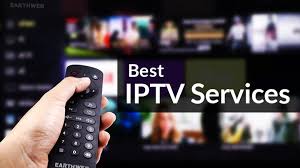In the digital age, how we consume television and entertainment content has drastically evolved. Traditional cable TV, once the go-to option, is now being overshadowed by more flexible and efficient methods of viewing, such as IPTV (Internet Protocol Television). IPTV is changing the way people access television shows, movies, live sports, and other iptv aanbieder nederland, offering significant advantages over traditional broadcast methods. But what exactly is IPTV, and why is it becoming so popular?
What is IPTV?
IPTV stands for Internet Protocol Television, which refers to the delivery of television content through the internet, rather than traditional satellite or cable services. With IPTV, users can access their favorite TV shows, movies, sports, and more via a broadband connection. IPTV is based on the IP protocol, which is the same technology that powers the internet and allows for digital communication across devices.
Unlike traditional cable or satellite TV, where signals are transmitted through cables or airwaves, IPTV sends content over an internet connection, typically via a set-top box, smart TV app, or even mobile devices like smartphones and tablets.
How Does IPTV Work?
IPTV works by delivering video content in digital packets over an internet connection. These packets are transmitted via a high-speed broadband connection, enabling the user to access real-time television broadcasts or on-demand content. The content is delivered in a similar way to how websites load, allowing users to watch TV channels or movies instantly.
The IPTV system typically includes three key components:
- Content Providers: These are companies that create and distribute television programming (e.g., sports channels, news networks, movie studios).
- IPTV Service Providers: These companies or platforms aggregate the content and deliver it to end-users via an internet connection. Examples include popular IPTV providers like Netflix, Hulu, and Amazon Prime Video.
- User Devices: Viewers access IPTV content on devices such as smart TVs, computers, tablets, or smartphones using specialized software or apps.
Types of IPTV
There are three primary types of IPTV services:
- Live TV
Live IPTV provides access to real-time broadcasted TV shows, news programs, live sports, and more. It’s similar to traditional television, except it is delivered through an internet connection rather than via cable or satellite. - Video on Demand (VOD)
With VOD, users can access a library of movies, TV shows, and documentaries whenever they choose, offering more flexibility than traditional television. Services like Netflix, Amazon Prime, and Disney+ are examples of VOD-based IPTV. - Time-Shifted TV
Time-shifted TV allows users to watch previously aired shows at their convenience. It typically includes services such as catch-up TV, where viewers can watch shows that have aired in the past 24 to 48 hours. - Interactive TV
IPTV can also include interactive services, such as voting, gaming, or other interactive content. These services are designed to engage viewers in real-time, allowing them to participate in live events or interact with the content on the screen.
Advantages of IPTV
- Flexibility and Convenience
One of the biggest advantages of IPTV is the ability to watch content on multiple devices, from smart TVs to smartphones and tablets. Users can also access IPTV services anywhere, as long as they have an internet connection. This level of flexibility is not offered by traditional cable TV. - Variety of Content
IPTV offers a wide range of content options, including live TV, on-demand videos, and interactive features. Users can choose from thousands of channels, movies, documentaries, sports events, and more, catering to all types of tastes and interests. - High-Quality Streaming
IPTV typically offers high-definition (HD) and 4K video quality, giving viewers a premium viewing experience. Unlike cable TV, which may have signal issues or low-resolution broadcasts, IPTV ensures that content is delivered in high-quality formats, provided the internet connection supports it. - Cost-Effective
For many users, IPTV is a more affordable option compared to traditional cable or satellite TV services. Subscription-based IPTV services offer competitive pricing, and some even allow users to select specific packages or channels, reducing the cost of content they don’t watch. - On-Demand Viewing
One of the most popular features of IPTV is on-demand viewing. With IPTV services, users can choose to watch content at any time, making it ideal for those with busy schedules who prefer flexibility over a rigid broadcast schedule. - Personalization
IPTV allows for personalized recommendations based on the viewer’s preferences and watching habits. This makes it easier for users to discover new content that matches their interests.
Disadvantages of IPTV
- Dependence on Internet Connection
Since IPTV relies on an internet connection, a fast and stable broadband connection is essential. Slow or unreliable internet can lead to buffering, poor video quality, or interruptions in the streaming experience. - Limited Availability in Some Areas
IPTV services may not be available in all geographic regions, especially in areas where high-speed internet infrastructure is lacking. This can limit access for some users, particularly in rural or remote locations. - Device Compatibility
Some IPTV services may only be available on certain devices, limiting accessibility for users who don’t have the necessary hardware or software to access the service.
Popular IPTV Services
- Netflix: Known for its vast library of movies, TV shows, documentaries, and original content.
- Hulu: Offers on-demand TV shows, movies, and live TV options.
- Amazon Prime Video: Provides a wide selection of films, series, and live events, including exclusive content.
- YouTube TV: Offers live television streaming, including major networks and sports channels.
- Sling TV: A more budget-friendly live TV streaming service with customizable channel packages.
Conclusion
IPTV is revolutionizing the way we consume television, offering flexibility, convenience, and access to an ever-expanding library of content. As technology continues to evolve, IPTV is poised to become the dominant method for accessing television and video entertainment, surpassing traditional cable and satellite systems. Whether you’re looking for live TV, on-demand movies, or interactive content, IPTV provides a modern solution for all your viewing needs.

